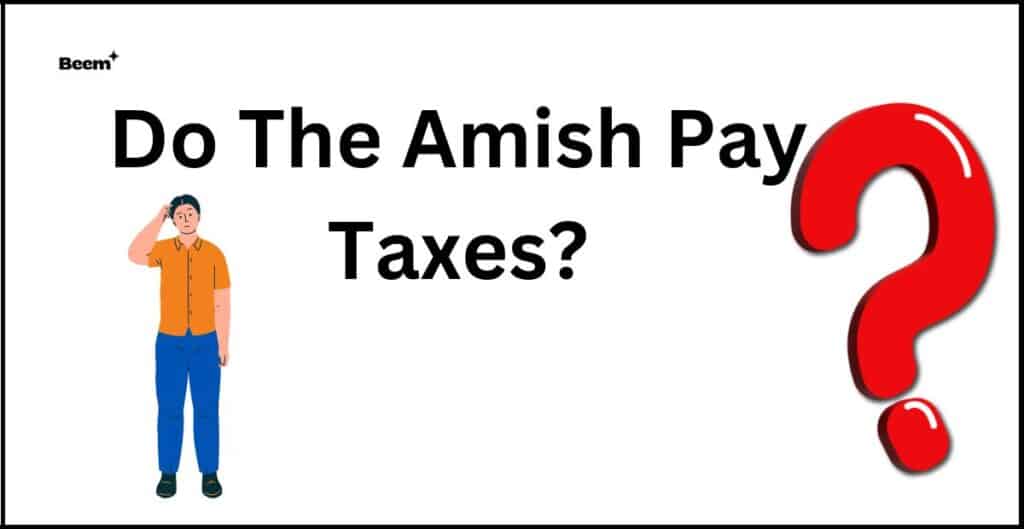Table of Contents
The Amish are a unique group of people, known for their traditional way of life and their dedication to simple, rural living. Despite their distinct culture and religious practices, the question often arises: do the Amish pay taxes?
In this blog, we will take an in-depth look at the Amish community’s relationship with taxes in the United States.
We’ll explore how taxes apply to the Amish, what kinds of taxes they may be exempt from, and how the U.S. tax code accommodates their specific lifestyle. By the end, you’ll have a clear understanding of the Amish tax situation and the nuances surrounding it.
Amish communities tend to be private and avoid anything government-related. Still, they respect and abide by appropriate tax laws in their communities. Depending on the state and community in which they live, there may be tax exemptions and changes. Let’s try to answer the question: Do the Amish pay taxes?
Amish communities often do their taxes, while others hire outside accountants. Amish accountants and bookkeepers may even be found in larger Amish communities.
Let’s explore Amish taxes in more detail.
Understanding the Amish Community
The Amish are a religious group that originated in Europe during the 16th century, but they are most commonly associated with the United States, particularly in Pennsylvania, Ohio, and Indiana. Their lifestyle is defined by simplicity, humility, and a strict adherence to religious beliefs.
The Amish community is primarily agricultural and uses horse-drawn buggies instead of cars, eschews modern technology such as electricity, and lives a largely self-sufficient lifestyle.
The Amish follow the teachings of the Bible and believe in separating themselves from the secular world. This means they often reject many modern conveniences in favor of traditional farming, handcrafts, and close-knit community life.
As a result, their relationship with the U.S. government, particularly in regard to taxation, is often misunderstood and shrouded in mystery.
Do The Amish Pay Taxes?

The short answer is yes, Amish people do pay taxes. However, their tax situation is not as straightforward as that of other U.S. citizens.
They are subject to the same federal, state, and local taxes that apply to other Americans, including property taxes, sales taxes, and income taxes.
The key distinction lies in certain exemptions and provisions related to their religious beliefs and lifestyle.
So, yes, the Amish pay taxes which includes sales tax, property tax, and income tax. They pay state, local, and federal income taxes. However, they do not pay taxes on the benefits they do not enjoy. These include social security and employment taxes.
Also, check out Beem to get a quick and accurate estimate of your federal and state taxes and get the maximum refund.
Which Taxes Do the Amish People Pay?
While Amish communities are exempt from some taxes, they pay some taxes that apply to themselves and their communities.
In addition to property taxes, sales taxes, and income taxes for local public schools they rarely attend, the Amish pay state and sales taxes.
While the Amish people pay income taxes, they do not pay taxes for social programs like welfare, unemployment, and social security.
Income Taxes
There are federal and state income taxes for Amish communities. The amount depends on how much an individual earns in a year. It is common for Amish individuals and communities to make their living by performing manual labor, such as farming and selling homemade goods.
Business owners among Amish families and individuals contribute to their communities’ economies and provide support.
Property Taxes
Amish communities have a lot of property taxes due to the amount of land owned by average Amish families. Farming is one of the Amish communities’ primary sources of income, so there are more property taxes than in the middle community.
Due to the size of their land, it is a common problem for many Amish families to pay their property taxes. Taxes fund farming land and public services, such as schools and libraries.
Sales Taxes
There is a sales tax on all Amish products that affects all communities. As a result of their communities being self-sufficient and self-providing, many Amish only pay a little in sales taxes. Amish communities usually don’t purchase goods from major retailers or retail establishments.
Amish communities pay all applicable taxes when they visit establishments or stores to buy goods or services.
Are the Amish Exempt from Any Taxes?
Amish people can be exempt from paying FICA, FUTA, and Self-Employment tax due to certain aspects and beliefs of their lifestyle.
According to their religious beliefs, the Amish do not have to pay certain taxes, regardless of whether they are mentioned in the law.
Social Security Exemption
The exemption from Social Security taxes is rooted in a 1960s legal ruling in which the Amish community won the right to avoid paying into the Social Security system.
The case that led to this exemption was based on the argument that the Amish rely on their communities for care in old age, rather than the federal government.
This exemption applies only to those who are part of the Amish faith, and it is an important distinction that sets them apart from other taxpayers.
Since the Amish do not use Social Security benefits, they are also exempt from paying into Medicare. However, this exemption is not universal. Those who do not practice the Amish faith but follow similar lifestyle choices may still be required to pay into the Social Security system.
Also Read: Do Strippers Pay Taxes?
Gas Tax
Many Amish communities don’t have to pay the gas tax because they use few machines and vehicles. Although Amish communities use horse-drawn buggies as a primary mode of transportation, some businesses use machinery to operate. Still, they often find ways to use old machines that don’t use gasoline.
It is also known as the “sin” tax, which applies to items and products that are considered morally hazardous by the Amish.
The Amish don’t allow liquor or any tobacco product in their communities as a result of their religious beliefs; therefore, goods and services such as liquor, cigarettes, and gambling fall under this tax.
Why Are Amish Exempt from Social Security Taxes?
The most notable tax exemption enjoyed by the Amish relates to Social Security taxes. The Amish believe that paying into Social Security would interfere with their religious beliefs, as it represents a form of dependence on government assistance rather than on their communities or religious organizations.
They rely on their extended families and church communities to care for them in old age, and they do not see the need for government-provided retirement or health benefits.
As mentioned earlier, this exemption was solidified in the 1960s after a court ruling, which allowed Amish people to be exempt from paying into the Social Security system.
This decision was based on the fact that the Amish’s religious beliefs prevent them from receiving benefits from government programs, including Social Security and Medicare.
The exemption has been a point of contention for some critics, who argue that it places an unfair burden on the rest of society to support the elderly Amish who do not pay into Social Security.
However, this legal exemption is firmly rooted in the Amish faith’s belief in self-reliance and communal support.
Are There Any Other Exemptions for Amish People?
In addition to the exemption from Social Security taxes, the Amish community also enjoys some other unique exemptions in their dealings with the government.
These exemptions may vary by state and local jurisdiction, but here are a few key examples:
- Exemption from Health Insurance Mandates: The Amish are exempt from the Affordable Care Act’s (ACA) requirement that individuals purchase health insurance. This is due to their religious beliefs, which discourage them from relying on insurance programs. Instead, they rely on mutual aid and community support to help cover medical costs.
- Exemption from Military Service: The Amish are conscientious objectors and, as such, are exempt from mandatory military service. This exemption is based on their religious principles, which prohibit them from engaging in violent conflict.
- Exemption from Public Schools: While not directly related to taxes, the Amish community has historically been allowed to opt out of sending their children to public schools. Instead, Amish children typically receive an education in private, church-run schools that focus on traditional academic subjects and vocational training.
Do Amish Pay Taxes in the U.S.?
Yes, Amish pay taxes in the U.S., but with some significant exemptions. The Amish community adheres to the law but does so in a way that reflects their religious beliefs and lifestyle.
While they pay property taxes, sales taxes, and other local taxes, they are exempt from paying Social Security and Medicare taxes.
They also have some leeway in how they handle health insurance and military service, depending on their specific beliefs.
It’s important to note that while some Amish individuals may try to avoid certain taxes as a matter of religious principle, they still comply with the law when it comes to most other forms of taxation. The unique exemptions and tax situations of the Amish reflect the delicate balance between their faith and the tax system in the U.S.
Conclusion
So, do the Amish pay taxes? The Amish pay income, sales, and real estate taxes. In contrast, self-employed Amish, as well as those employed by non-Amish, do not pay Social Security taxes. Therefore, they do not receive Social Security benefits and unemployment benefits.
There is no doubt that the Amish pay their fair share of taxes. In some cases, they even pay more than the average American. Sometimes, the money they give does not benefit them, but they feel it is more important to do their duty and make a difference.
If you need more clarification about the process, consult a tax professional or seek assistance like Beem provides online.
Frequently Asked Questions About Amish Tax Obligations
Do Amish people pay taxes?
Yes, Amish people do pay income taxes if their earnings exceed the required threshold set by the IRS. However, they are exempt from paying Social Security and Medicare taxes due to their religious beliefs.
Are Amish exempt from all taxes?
No, Amish people are not exempt from all taxes. They still pay property taxes, sales taxes, and local taxes. The major exemption applies to Social Security and Medicare taxes.
Are Amish exempt from Social Security tax?
Yes, Amish individuals are exempt from paying Social Security and Medicare taxes due to their religious beliefs, which prohibit participation in government programs.
This exemption was established in the 1960s after a legal ruling that allowed the Amish to avoid contributing to the Social Security system. Instead, the Amish rely on their communities for financial support in old age, aligning with their religious principles of self-reliance.
Do the Amish get money from the government?
Generally, the Amish do not receive money from the government, as they avoid government assistance programs due to their religious beliefs.
They are exempt from Social Security and Medicare, meaning they do not receive benefits from those programs. Instead, the Amish rely on their tight-knit community for financial and social support, such as healthcare and care for the elderly.
Do Amish People Pay Property Taxes?
Yes, Amish people are required to pay property taxes on their land and buildings, just like other property owners in the United States. Property taxes are assessed by local governments to fund services such as schools, roads, and emergency services.
While Amish individuals may seek exemptions or reduced rates in certain cases, they are generally subject to the same property tax laws as their non-Amish neighbors.
How Do Amish Pay Property Taxes?
Amish people pay property taxes in the same way as other property owners in the United States, typically through checks or money orders. Although they often avoid using modern banking systems or electronic payments, they still adhere to the legal requirement of paying taxes on their land and property.















































